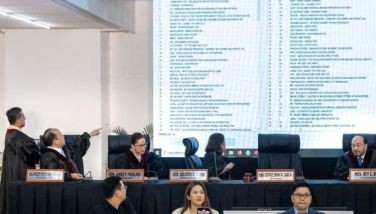Chinese, Vietnamese fishermen stranded in RP
September 5, 2004 | 12:00am
PUERTO PRINCESA CITY — Huddled in small groups in a prison courtyard here, Chinese and Vietnamese fishermen sit listlessly, anxious to know how their families back home are coping without their support.
Stuck behind bars in a strange land, the fishermen have no immediate prospect for repatriation, with the Philippines asserting its territorial authority against a wave of poachers from neighboring countries.
The 29 Chinese and 21 Vietnamese held in the provincial jail on western Palawan Island, some of whom have been here since July last year, loiter silently around the courtyard, dressed in donated clothes.
Jail guards say the two groups of prisoners, who can barely communicate with local officials due to language barriers, do not cause any trouble.
"I think they are frightened about being here," one guard said.
Under Philippine law, illegal fishing boats are confiscated and their crews are fined $100,000 per vessel. Fishermen are held until the fines are paid. The problem is that many are unable to come up with the money.
The owners of the fishing boats, safe overseas, apparently have no interest in paying the fines and the Philippine government is not pursuing them, leaving the fishermen stranded.
Foreign poachers only had to endure short stints in jail during the 1990s, but that all changed in 2001 when Manila became more hardline.
The reasons for the crackdown are not clear but officials say it was not linked to a territorial dispute between Manila and its neighbors, including China and Vietnam, over the Spratly Islands to the west of Palawan in the South China Sea.
Previously, those arrested would spend only a few months in jail before being allowed to live on their boats at the Puerto Princesa port until the government decided to let them go.
Prosecutors, not wishing to stir the diplomatic waters, rarely requested full penalties and did not seek convictions for more serious crimes such as poaching endangered species, which is punishable by up to 12 years in prison.
Officials say the increasing number of arrests and detentions of illegal fishermen is due to pressure from environmental groups and local fishing communities, who argue the poachers are a threat to endangered species and use destructive methods such as spraying cyanide to poison the fish.
Vice-Admiral Ruben Domingo, head of the military forces in the region, says the new hardline approach is independent from Manila’s claims to the Spratlys, noting most of the poachers caught this year were seized in the Sulu Sea, on the opposite side of the island.
"We have progressed a lot. Before, poachers were just released without any fines. Now, all the line agencies know their jobs. Everybody tries to pitch in and get a conviction," says Domingo.
Domingo, who also heads a government committee against illegal entrants, says Palawan has become a model for a "stronger" policy nationwide against poachers.
Navy records show about 11 vessels with 69 foreign poachers were detained in the whole Philippines in 2003. Of this number, five boats and 58 foreigners were caught in the waters off Palawan.
The impact of poachers is difficult to estimate. Philippine fish catches from the sea rose by more than six percent last year to about 2.15 million tons.
But Angelique Songco, manager of the Tubbataha Reef, a premier marine reserve near Palawan, said the public has grown increasingly concerned about poachers catching protected species like sea turtles or breeding fish during mating season.
"Over here, we won’t let them get away with this. We know what our rights are. This is our patrimony," Songco said.
However Nguyen Van Lam, a local Vietnamese resident and a volunteer interpreter for the prisoners, says the men did not know they were fishing in Philippine waters and have vowed not to use the waters again if released.
Lam says while the Vietnamese fishermen feel they have been treated well and get enough food in prison, their main concern is their families have no one else to support them.
"They are worried about staying here, to be imprisoned for a long time. They are the breadwinners," he said.
Lam says he has been trying to secure their release by getting documents from the Vietnamese embassy here to certify there was no way the men could pay the fine.
One jail warden, Leslie Espino, says the Vietnamese embassy has sent a representative only once — to check on the conditions of their nationals but the Chinese embassy has been much more active in getting its nationals released.
"The Vietnamese and the Chinese embassies have a different style of helping their countrymen," Espino said.
"The Chinese ambassador said he recognizes we have laws that need to be followed and they respect the jurisdiction of the courts," explains Domingo.
Stuck behind bars in a strange land, the fishermen have no immediate prospect for repatriation, with the Philippines asserting its territorial authority against a wave of poachers from neighboring countries.
The 29 Chinese and 21 Vietnamese held in the provincial jail on western Palawan Island, some of whom have been here since July last year, loiter silently around the courtyard, dressed in donated clothes.
Jail guards say the two groups of prisoners, who can barely communicate with local officials due to language barriers, do not cause any trouble.
"I think they are frightened about being here," one guard said.
Under Philippine law, illegal fishing boats are confiscated and their crews are fined $100,000 per vessel. Fishermen are held until the fines are paid. The problem is that many are unable to come up with the money.
The owners of the fishing boats, safe overseas, apparently have no interest in paying the fines and the Philippine government is not pursuing them, leaving the fishermen stranded.
Foreign poachers only had to endure short stints in jail during the 1990s, but that all changed in 2001 when Manila became more hardline.
The reasons for the crackdown are not clear but officials say it was not linked to a territorial dispute between Manila and its neighbors, including China and Vietnam, over the Spratly Islands to the west of Palawan in the South China Sea.
Previously, those arrested would spend only a few months in jail before being allowed to live on their boats at the Puerto Princesa port until the government decided to let them go.
Prosecutors, not wishing to stir the diplomatic waters, rarely requested full penalties and did not seek convictions for more serious crimes such as poaching endangered species, which is punishable by up to 12 years in prison.
Officials say the increasing number of arrests and detentions of illegal fishermen is due to pressure from environmental groups and local fishing communities, who argue the poachers are a threat to endangered species and use destructive methods such as spraying cyanide to poison the fish.
Vice-Admiral Ruben Domingo, head of the military forces in the region, says the new hardline approach is independent from Manila’s claims to the Spratlys, noting most of the poachers caught this year were seized in the Sulu Sea, on the opposite side of the island.
"We have progressed a lot. Before, poachers were just released without any fines. Now, all the line agencies know their jobs. Everybody tries to pitch in and get a conviction," says Domingo.
Domingo, who also heads a government committee against illegal entrants, says Palawan has become a model for a "stronger" policy nationwide against poachers.
Navy records show about 11 vessels with 69 foreign poachers were detained in the whole Philippines in 2003. Of this number, five boats and 58 foreigners were caught in the waters off Palawan.
The impact of poachers is difficult to estimate. Philippine fish catches from the sea rose by more than six percent last year to about 2.15 million tons.
But Angelique Songco, manager of the Tubbataha Reef, a premier marine reserve near Palawan, said the public has grown increasingly concerned about poachers catching protected species like sea turtles or breeding fish during mating season.
"Over here, we won’t let them get away with this. We know what our rights are. This is our patrimony," Songco said.
However Nguyen Van Lam, a local Vietnamese resident and a volunteer interpreter for the prisoners, says the men did not know they were fishing in Philippine waters and have vowed not to use the waters again if released.
Lam says while the Vietnamese fishermen feel they have been treated well and get enough food in prison, their main concern is their families have no one else to support them.
"They are worried about staying here, to be imprisoned for a long time. They are the breadwinners," he said.
Lam says he has been trying to secure their release by getting documents from the Vietnamese embassy here to certify there was no way the men could pay the fine.
One jail warden, Leslie Espino, says the Vietnamese embassy has sent a representative only once — to check on the conditions of their nationals but the Chinese embassy has been much more active in getting its nationals released.
"The Vietnamese and the Chinese embassies have a different style of helping their countrymen," Espino said.
"The Chinese ambassador said he recognizes we have laws that need to be followed and they respect the jurisdiction of the courts," explains Domingo.
BrandSpace Articles
<
>
- Latest
- Trending
Trending
Latest
Trending
Latest
Recommended































